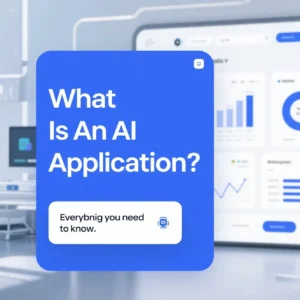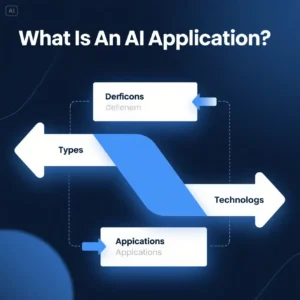Artificial Intelligence applications are revolutionizing how we work, communicate, and solve complex problems in 2025. If you’ve ever wondered what exactly constitutes an AI application and how these powerful tools can transform your business or personal productivity, you’ve come to the right place.

Understanding AI Applications: The Fundamentals
An AI application is software that uses artificial intelligence technologies to perform tasks that typically require human intelligence. These applications can learn from data, recognize patterns, make decisions, and even predict future outcomes with remarkable accuracy.
Unlike traditional software that follows pre-programmed instructions, AI applications adapt and improve their performance over time. They process vast amounts of information, identify trends that humans might miss, and provide intelligent recommendations or automated solutions.
Core Components of AI Applications
Machine Learning Algorithms
The heart of any AI application lies in its machine learning algorithms. These mathematical models enable the software to learn from data without being explicitly programmed for every scenario. Popular algorithms include neural networks, decision trees, and deep learning models.
Data Processing Engines
AI applications require sophisticated data processing capabilities to handle structured and unstructured information. This includes text, images, audio, video, and numerical data from various sources.
Natural Language Processing (NLP)
Many AI applications incorporate NLP to understand and generate human language. This enables features like chatbots, voice assistants, and automated content creation.
Computer Vision
Applications that work with images or videos use computer vision technology to identify objects, faces, text, and patterns within visual content.
Types of AI Applications

Business Intelligence Applications
These tools analyze business data to provide insights for decision-making. They can predict market trends, optimize pricing strategies, and identify growth opportunities.
Key Features:
- Predictive analytics
- Automated reporting
- Risk assessment
- Performance optimization
Content Creation Applications
AI-powered content tools help create written content, images, videos, and audio materials. Popular examples include GPT-based writing assistants and AI image generators.
Popular Uses:
- Blog post generation
- Social media content
- Marketing copy
- Visual design assets
Customer Service Applications
AI chatbots and virtual assistants handle customer inquiries, provide support, and resolve issues 24/7 without human intervention.
Benefits:
- Instant response times
- Consistent service quality
- Cost reduction
- Multilingual support
Automation Applications

These tools automate repetitive tasks across various business processes, from email management to data entry and workflow optimization.
Common Applications:
- Email automation
- Social media scheduling
- Data processing
- Lead generation
How AI Applications Work
Data Collection and Preparation
AI applications begin by collecting relevant data from various sources. This data is then cleaned, organized, and prepared for analysis. The quality of input data directly impacts the application’s performance.
Training Phase
During training, the AI model learns from historical data to identify patterns and relationships. This process can take hours, days, or even weeks depending on the complexity and data volume.
Inference and Prediction
Once trained, the application can make predictions or decisions based on new input data. This is where users see the practical benefits of AI technology.
Continuous Learning
Advanced AI applications continue learning from new data and user interactions, improving their accuracy and effectiveness over time.
Benefits of Using AI Applications

Increased Efficiency
AI applications can process information and complete tasks much faster than humans, often handling multiple operations simultaneously.
Cost Reduction
By automating routine tasks, businesses can reduce labor costs and allocate human resources to more strategic activities.
Improved Accuracy
AI applications eliminate human error in data processing and analysis, providing more reliable results.
24/7 Availability
Unlike human workers, AI applications can operate continuously without breaks, vacations, or sick days.
Scalability
AI applications can handle increasing workloads without proportional increases in costs or resources.
Data-Driven Insights
These tools can analyze vast datasets to uncover insights that would be impossible for humans to identify manually.
Challenges and Limitations
Data Quality Dependencies
AI applications are only as good as the data they’re trained on. Poor quality or biased data can lead to inaccurate results.
Initial Setup Costs
Implementing AI applications often requires significant upfront investment in technology and training.
Learning Curve
Users may need time to understand how to effectively use AI applications and interpret their outputs.
Privacy and Security Concerns
AI applications often handle sensitive data, raising concerns about privacy protection and cybersecurity.
Ethical Considerations
Questions about AI bias, job displacement, and decision transparency require careful consideration.
Popular AI Application Categories in 2025
Marketing and Sales
AI applications in marketing help with lead scoring, customer segmentation, personalized recommendations, and campaign optimization.
Healthcare
Medical AI applications assist with diagnosis, treatment planning, drug discovery, and patient monitoring.
Finance
Financial institutions use AI for fraud detection, risk assessment, algorithmic trading, and customer service.
Education
Educational AI applications provide personalized learning experiences, automated grading, and intelligent tutoring systems.
Manufacturing
AI optimizes production processes, predicts equipment maintenance needs, and ensures quality control.
Choosing the Right AI Application
Identify Your Needs
Clearly define what problems you want to solve or what processes you want to improve.
Evaluate Features
Look for applications that offer the specific capabilities you need without unnecessary complexity.
Consider Integration
Ensure the AI application can integrate with your existing tools and workflows.
Assess Scalability
Choose solutions that can grow with your business needs.
Review Support and Training
Look for vendors that provide adequate training resources and ongoing support.
Future of AI Applications
The AI application landscape continues evolving rapidly. Emerging trends include:
- Multimodal AI: Applications that can process multiple types of data simultaneously
- Edge AI: AI processing on local devices rather than cloud servers
- Explainable AI: Applications that can explain their decision-making processes
- Autonomous AI: Systems that can operate with minimal human oversight
Getting Started with AI Applications
Start Small
Begin with simple AI tools that address specific pain points in your workflow.
Focus on Data Quality
Ensure you have clean, relevant data before implementing AI solutions.
Invest in Training
Provide adequate training for team members who will use AI applications.
Monitor Performance
Regularly assess the effectiveness of your AI applications and make adjustments as needed.
Stay Informed
Keep up with AI developments to identify new opportunities for improvement.
Conclusion
AI applications represent a transformative technology that’s reshaping industries and creating new possibilities for innovation. While they come with challenges and limitations, the benefits of increased efficiency, accuracy, and insights make them invaluable tools for modern businesses and individuals.
Success with AI applications requires understanding their capabilities, choosing the right solutions for your needs, and investing in proper implementation and training. As AI technology continues advancing, those who embrace these applications thoughtfully will gain significant competitive advantages in their respective fields.
Whether you’re looking to automate routine tasks, gain deeper insights from your data, or create innovative products and services, AI applications offer powerful solutions that can help you achieve your goals more effectively than ever before.